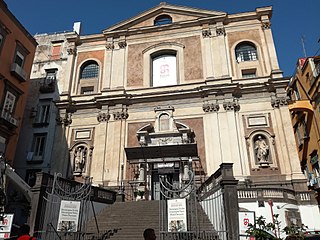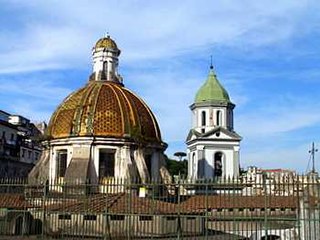
Galeazzo Alessi was an Italian architect from Perugia, known throughout Europe for his distinctive style based on his enthusiasm for ancient architecture. He studied drawing for civil and military architecture under the direction of Giovanni Battista Caporali.

Cosimo Fanzago was an Italian architect and sculptor, generally considered the greatest such artist of the Baroque period in Naples, Italy.

Oliviero Carafa, in Latin Oliverius Carafa, was an Italian cardinal and diplomat of the Renaissance. Like the majority of his era's prelates, he displayed the lavish and conspicuous standard of living that was expected of a prince of the Church. In his career he set an example of conscientiousness for his contemporaries and mentored his relative, Giovanni Pietro Carafa, who became Pope Paul IV.

Santa Maria Donnregina Nuova is a church in central Naples, Italy. It is called Nuova ("new") to distinguish it from the older Angevin church of Santa Maria Donna Regina Vecchia.
This is a list of music conservatories in Naples, Italy.

Santa Maria la Nova is a Renaissance style, now-deconsecrated, Roman Catholic church and monastery in central Naples. The church is located at the beginning of a side street directly across from the east side of the main post office, a few blocks south of the Church and Monastery of Santa Chiara. Today the adjacent monastery is a meeting site and hosts the Museo ARCA of modern religious art.

Sant'Anna dei Lombardi,, and also known as Santa Maria di Monte Oliveto, is an ancient church and convent located in piazza Monteoliveto in central Naples, Italy. Across Monteoliveto street from the Fountain in the square is the Renaissance palace of Orsini di Gravina.

Via dei Tribunali is a street in the old historic center of Naples, Italy.

Giuseppe Nuvolo was an Italian architect, an exponent of the Mannerist and early Baroque architecture, active mostly in Naples.

The Ospedale degli Incurabili or Complesso degli Incurabili is an ancient and prominent hospital complex located on Via Maria Longo in central Naples, Italy. Part of the complex, including the remarkable pharmacy, are now the Museo delle arti sanitarie of Naples.

San Giuseppe dei Ruffi or church of San Giuseppe dei Ruffo is a church located on piazzetta San Giuseppe dei Ruffi, in Naples, Italy.

Santa Maria della Mercede e Sant'Alfonso Maria de' Liguori is a Roman Catholic church located in via San Sebastiano #1 in the historic center of Naples, Italy. It rises on the South-Eastern corner of the intersection of Via San Sebastiano - Via Santa Maria di Constantinopoli, and the Vico San Pietro da Maiella and the outlet of the Via Port'Alba, a narrow alley starting at the medieval gate of Port'Alba. The Vico San Pietro da Maiella feeds into the southernmost end of Via dei Tribunali, corner with via San Sebastiano, and on the Vico, neighboring to the east and behind the church, stands the Conservatory of San Pietro a Majella.

Santa Maria Donnaromita is a former church located on via Paladino in Naples.

Santa Maria della Pace is a Roman Catholic church attached to a monastery and hospital, located on Via dei Tribunali corner with Via Castel Capuano, just after the piazzetta Sedil Capuano, in Naples, Italy.

The church of Santa Maria di Montesanto and the annexed monastery were built in Naples, Italy, by a community of Carmelite friars that had its origins in Montesanto, Sicily.

Santa Maria Regina Coeli is a Roman Catholic church in central Naples, Italy.

Santa Maria della Sapienza is a Roman Catholic church, located on Via Costantinopoli in central Naples, Italy.

The church of Santi Severino e Sossio and the annexed monastery are located on via Bartolommeo Capasso in Naples, Italy.
Arcangelo Guglielmelli was an Italian architect and painter, active in his native Naples, Italy, in a late-Baroque style. He was involved in the building and reconstruction of churches, many of which had been damaged by the earthquakes of 1688 and 1694.
Salvatore Fighera was an Italian composer of both sacred and secular music. Born in Gravina in Puglia, he completed his musical studies at the Conservatorio di Sant'Onofrio a Capuana in Naples and spent several years in Milan after leaving the conservatory in 1783. On his return to Naples he served as the maestro di cappella of several churches, most notably the Santuario di San Sebastiano Martire, a post he held until his death.
















